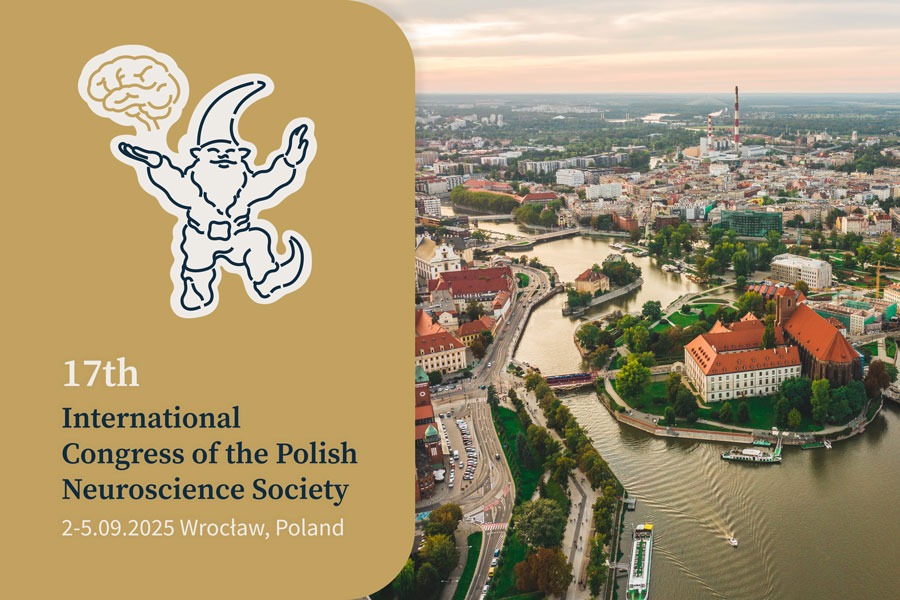
Wrocław – the capital of neuroscience: 17th International Congress of the Polish Neuroscience Society this September
The human brain contains 86 billion neurons and just as many glial cells, responsible for supportive, nutritional, and protective functions. Each neuron can form connections with thousands of others, creating a network of trillions of synapses. These connections determine the brain’s capabilities – they are what make it so extraordinary. And so difficult to study.
The importance of understanding the brain and the mechanisms behind its diseases is highlighted by increasingly alarming statistics. At present, 179 million Europeans live with brain disorders – both neurological and psychiatric. That is equivalent to the populations of Germany, France, and half of Poland combined. These diseases generate €800 billion in annual costs, representing as much as 45% of Europe’s healthcare budgets, and are now classified as lifestyle-related diseases. This means they will occur with growing frequency, as they stem from modern ways of living. The situation is further exacerbated by ageing societies – while we live longer, the risk of neurodegenerative diseases such as Alzheimer’s and Parkinson’s increases with age.
It is precisely these issues that will be discussed by over 300 scientists during the 17th International Congress of the Polish Neuroscience Society (PTBUN), which will open on 2 September at the Conference Centre of Wrocław University of Science and Technology. Hosting the event in Wrocław – for the first time in 30 years since its inception – has been made possible thanks to the joint efforts of neurobiologists from six of the city’s research institutions, signatories of the Wrocław BioTech Hub: Wrocław University of Science and Technology, the University of Wrocław, Wrocław Medical University, Wrocław University of Environmental and Life Sciences, the Institute of Immunology and Experimental Therapy of the Polish Academy of Sciences, and Łukasiewicz – PORT.
World leaders in neuroscience in Wrocław
The congress will feature leading brain researchers from around the globe – internationally recognised leaders in neuroscience. Among them:
- Prof. John Cryan, University College Cork, Ireland – co-discoverer of the influence of the gut microbiome on the brain (can certain bacteria support the treatment of brain diseases?).
- Prof. Lora Heisler, University of Aberdeen – specialising in the brain’s relationship with eating disorders (what effects do popular drugs such as Ozempic have on skeletal muscles?).
- Prof. Andrew Holmes, US National Institutes of Health – working on the neurobiological foundations of stress responses (how do alcohol and stress alter our brains, and why not in the same way for everyone?).
- Prof. Marcin Szwed, Jagiellonian University – studying environmental impacts on brain health (could the smog inhaled by children be linked to ADHD?).
Neuroscience is not just the domain of academic debate – it is a science of immediate necessity, already shaping the quality of life for one in four Europeans. Only through interdisciplinary, international, and large-scale brain research can we rise to the challenges of our time. As a strong scientific centre, Wrocław is part of global efforts to understand how the brain works, the mechanisms of mental disorders, and the search for new therapies and technological solutions.
Highlights of the Scientific Programme
Professor Jerzy Mozrzymas (Wrocław Medical University) will chair a session with Dr Grzegorz Wiera and Professor Dariusz Rakus (Head of the Department of Physiology and Molecular Neurobiology, Faculty of Biological Sciences, University of Wrocław) on the mechanisms of synaptic plasticity, the foundation of memory. Dr Natalia Małek-Chudzik (Wrocław University of Science and Technology) will speak about the role of immune cells in pain modulation. Dr Mateusz Kucharczyk (Łukasiewicz – PORT) will address cancer pain – one of the most debilitating patient experiences – and new mechanisms with the potential to relieve pain without the risk of addiction or the side effects typical of opioids. Dr Ali Jawaid (Łukasiewicz – PORT) will explain how deeply traumatic stress can affect not only our own lives but also those of our children, and how trauma becomes inscribed in our bodies. Finally, Dr Bartosz Zglinicki (Łukasiewicz – PORT) will present the use of artificial intelligence in research on the effects of antidepressants on selected brain regions.
Neurosociety: Lower Silesia for Seniors
Alongside the congress, an open meeting will be held for residents of Lower Silesia, especially older adults and their families: Neurosociety: Seniors at the Centre of Medical Innovation. This will not be an academic debate, but a practical discussion of everyday issues – how to recognise the first symptoms of dementia, where to seek help, how to support loved ones, and how to design brain-friendly cities. The meeting will take place on 2 September, 15:00–16:45, at the Wrocław University of Science and Technology Congress Centre (8 Janiszewski Street). Participants will include scientists, doctors, representatives of local authorities, and senior organisations. Registration is required.
The 17th Congress of the Polish Neuroscience Society is held under the honorary patronage of the Rector of the University of Wrocław.
The University of Wrocław is a partner of the event.

Added by: S.F.
Date of publication: 25.08.2025



